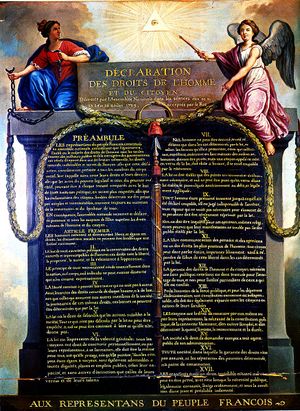Categories and generations of fundamental rights
Cyrus' Cylinder is sometimes considered as the first human rights declaration in history[1].
| Professeur(s) | Victor Monnier[2][3][4][5][6][7] |
|---|---|
| Cours | Introduction to law |
Lectures
- The definition of law
- The State
- The different branches of law
- The sources of law
- The great formative traditions of law
- The elements of the legal relationship
- The application of law
- The implementation of a law
- The evolution of Switzerland from its origins to the 20th century
- Switzerland's domestic legal framework
- Switzerland's state structure, political system and neutrality
- The evolution of international relations from the end of the 19th century to the middle of the 20th century
- The universal organizations
- European organisations and their relations with Switzerland
- Categories and generations of fundamental rights
- The origins of fundamental rights
- Declarations of rights at the end of the 18th century
- Towards the construction of a universal conception of fundamental rights in the 20th century
All these expressions cover a set of rights that derive from the very existence of man. They were still called "natural rights" in the 18th century; today they depend only on recognition by the State. Indeed, they are committed to ensuring that they are respected and protected. Today in the Swiss constitution, they are called "fundamental rights".
The four categories
The freedoms
They touch and protect a specific behaviour (moving, achieving, trading, etc.). They concern all forms of physical and psychological activity of the individual.
Political rights
This is the set of competences that the legal system recognises to the citizen. Their main purpose is the functioning of democracy:
- voting rights;
- right to elect;
- right to be elected.
Guarantees of the rule of law
These rights are fundamental rights that limit both the content and form of State activity and are intended to subject the State to compliance with some essential rules such as the principle of equality (prohibition of arbitrariness, prohibition of discrimination). They are intended to guarantee a certain type of behaviour by the State.
Social, economic and cultural rights
These rights and freedoms protect a specific human behaviour (working, living, eating, learning, cultivating). They aim to promote a certain behaviour of the State, which is obliged to call for the provision of a particular service such as the right to education. For example, training requires the state to organize this (primary) training. When the State must provide assistance, it must organize assistance measures.
The three generations of fundamental rights and the stages of their development
These different categories are the result of a long evolution beginning in the 18th century. First generation human rights mainly concern freedoms such as, for example, the French Declaration of Human Rights, but also the Virginia Declaration.
What is required of the State is respect for human freedoms by allowing individuals to participate in the functioning of democracy and democratic institutions.
The first generation includes political freedoms and rights. In the 18th century, citizens were given opportunities for choice, action and appreciation. The role of the State appears to be essentially negative. Therefore, what is expected of him is to lift the prohibitions that prevent the individual from flourishing.
The second generation appeared late at the end of the 19th and beginning of the 20th century with the advent of social rights. Now, unlike freedoms, the State is being asked to intervene to meet the needs felt by the men who benefit from progress and to ensure that its benefits are guaranteed. They depend exclusively on the State, which alone can ensure their implementation through its positive action (organization of schools, hospital and welfare organizations, etc.).
Third generation fundamental rights appeared at the end of the Second World War, which doctrine also called "solidarity rights": the right to peace, development, a healthy environment, the common heritage of humanity and information. They are at the bottom of the rights in gestation and have no legal value as they are at the claim level. Some rights enjoy a certain national or even international recognition. A day will come when they will find their place in positive law. (Ex- environmental law which finds its place in certain constitutional texts)
First, these fundamental rights are developed at the national level. This national stage takes place from the middle of the 18th century to the middle of the 20th century. The international State that sees the emergence of Human Rights at the national level proclaims the Universal Declaration of Human Rights. At European level, the European Convention on Human Rights was proclaimed on 4 November 1950, entering into force in 1953.
Annexes
- Déclaration de Virginie : étude de texte
- Déclaration universelle des droits de l'homme
- Convention européenne des Droits de l’Homme
- Texte intégral de la Déclaration universelle des droits de l’homme accompagné de quelques repères sur le site de l'ONU
- La page des droits de l'homme sur le site de l'ONU
- La déclaration universelle des droits de l'homme de 1948 sur le site du ministère français de la justice
- Présentation de la Déclaration universelle des Droits de l'Homme sur le Portail des droits de l'enfant
References
- ↑ Le Cylindre de Cyrus, enjeu diplomatique
- ↑ Publication de Victor Monnier repertoriées sur le site de l'Université de Genève
- ↑ Hommage à Victor Monnier sur le site de l'Université de Genève
- ↑ Publications de Victor Monnier sur Cairn.info
- ↑ Publications de Victor Monnier sur Openedition.org
- ↑ Page personnelle de Victor Monnier sur le site de l'Université de Aix-Marseille
- ↑ En Hommage À Victor Monnier.” Hommages.ch, 11 Mar. 2019, www.hommages.ch/Defunt/119766/Victor_MONNIER.

